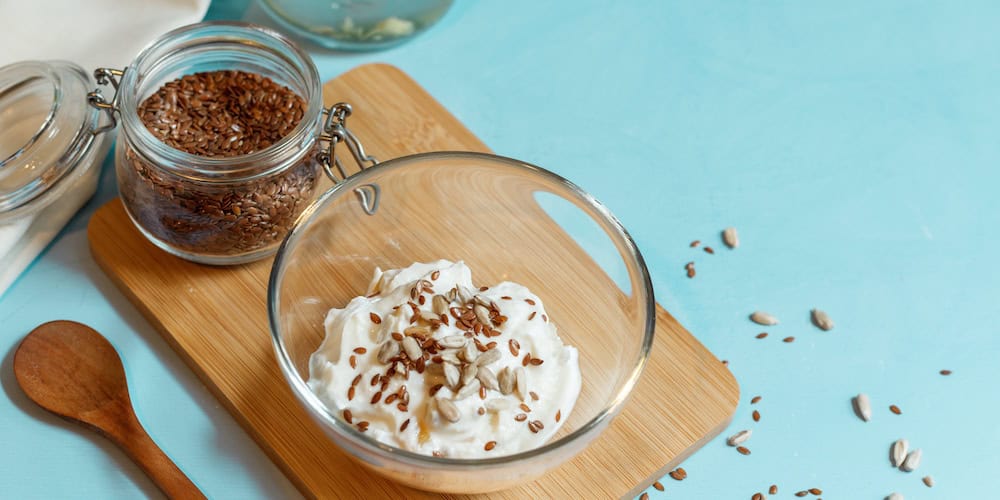Enhancing your yogurts is a delicious way to meet your needs and “break the routine,” in my opinion.
Full of benefits, seeds have a high nutritional density. Although small, they contain an incredible amount of energy, vitamins, minerals, and antioxidants.
They all originate from the plant kingdom, specifically from plant fruits. Each seed contains an embryo capable of becoming a new plant if it is used as a seed.
A small portion is enough to benefit from their exceptional composition. Another reason to eat them, most seeds are sources of plant-based proteins. Yogurt-based snacks with seeds are more satiating, as shown in this study with chia seeds.
They are also a nice way to add colors and textures. To choose which seed to add to your yogurts, I share these 6 ideas for healthy and tasty seeds with you.
📚 Read also | How to choose the best chia seeds?
1. Chia seeds, antioxidant and filling
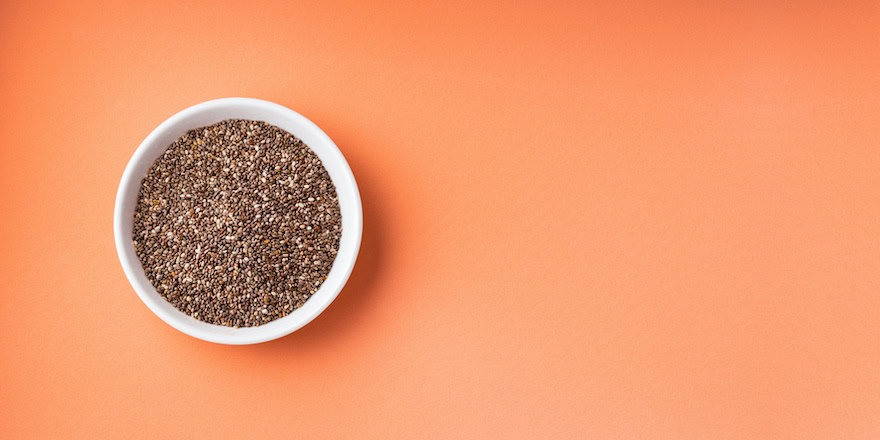
They are small, oval-shaped, black or white, with a relatively neutral taste. The nutritional profile of chia seeds is exceptional.
Sources of carbohydrates, plant-based proteins, omega-3, antioxidants, calcium, and magnesium, they contain an average of 490 kcal for 100 g of chia.
For intestinal health, appetite regulation, and weight management, 1 tablespoon per day is sufficient, as they are rich in soluble fibers: 35 g of fiber per 100 g.
Moreover, when in contact with a liquid, they swell and form a viscous gel. Chia can even replace eggs and serve as a binder for vegan recipes.
Choose a plain yogurt made from cow’s milk or plant-based milk, as you prefer. Pour it into a bowl, add 2 teaspoons of chia seeds and mix. Decorate with mango, crushed hazelnuts…
If you want a crunchy side, you can consume it immediately. If you prefer your chia seed yogurt with a creamy texture, just put it in the fridge for a few hours.
2. Sesame seeds, rich in omega-3s
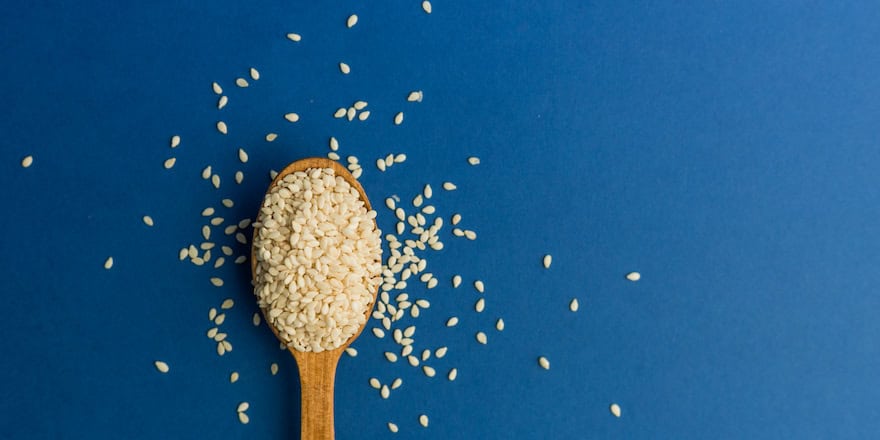
Their delicate flavor makes sesame seeds an excellent choice to make your yogurts delicious and nutritious.
Often used as simple decoration on burger buns, they are much more than that. They provide proteins and essential fatty acids with an ideal omega-6 / omega-3 ratio.
For athletes and pregnant women, their vitamin B3, B6, B9 content, iron, potassium, and selenium is particularly interesting.
Toast the sesame seeds for a few minutes in a pan and then add them to your yogurt: it’s a treat.
3. Flaxseeds for intestinal health
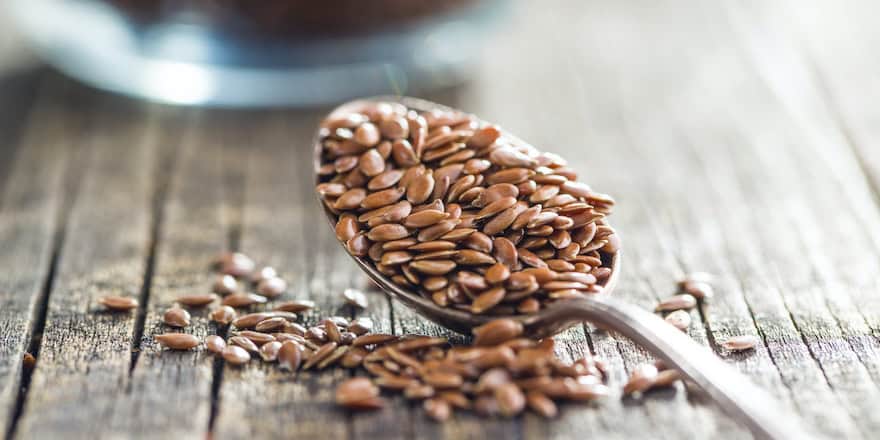
If you want to increase your fiber and omega-3 intake, 1 tablespoon of flaxseeds on your yogurt per day is a simple habit I advise you to adopt.
To consume them, they must be ground. To preserve them, keep them cool to prevent oxidation.
Less rich in carbohydrates than chia, they are, however, richer in lipids and proteins and more energetic: 530 calories per 100 g on average.
Other benefits, like their anti-inflammatory and phytoestrogenic potential, are subjects of numerous studies.
They have a laxative effect in case of constipation and are protective of the cardiovascular system.
4. Pumpkin seeds to be roasted
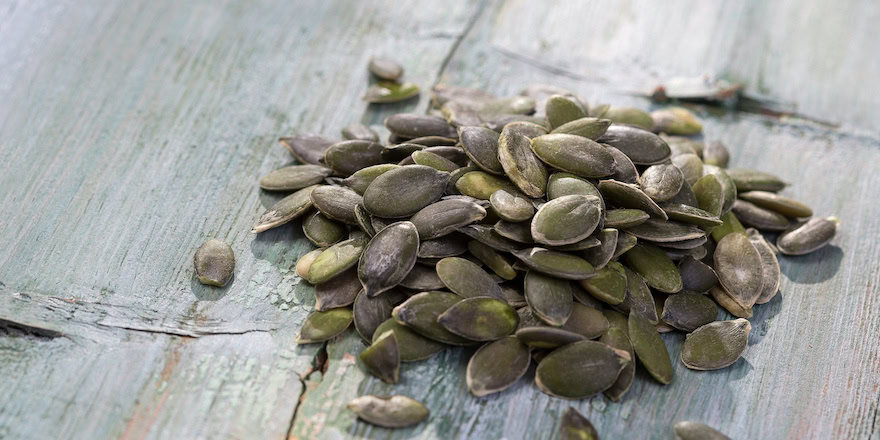
With their high concentration of phytosterols, it would be a shame to miss out! When it’s pumpkin season, be sure to save the seeds inside.
Once harvested, simply rinse them with water and roast for 10 to 15 minutes in the oven at 180°C. Thanks to their tryptophan content, a precursor amino acid for sleep, they make an ideal evening snack.
You can transform your yogurt with these seeds by simply adding them or mixing them with muesli: guaranteed crunch and full of nutrients.
With 6 g of protein for only 20 g, omega-3, iron, and a bit of fiber, pumpkin seeds are highly valued both for their flavors and their nutritional composition.
Another feature is that they are thought to have protective effects on the prostate when combined with other ingredients like saw palmetto and nettle, thanks to their antioxidants (notably carotenoids).
5. The Multiple Benefits of Hemp Seeds
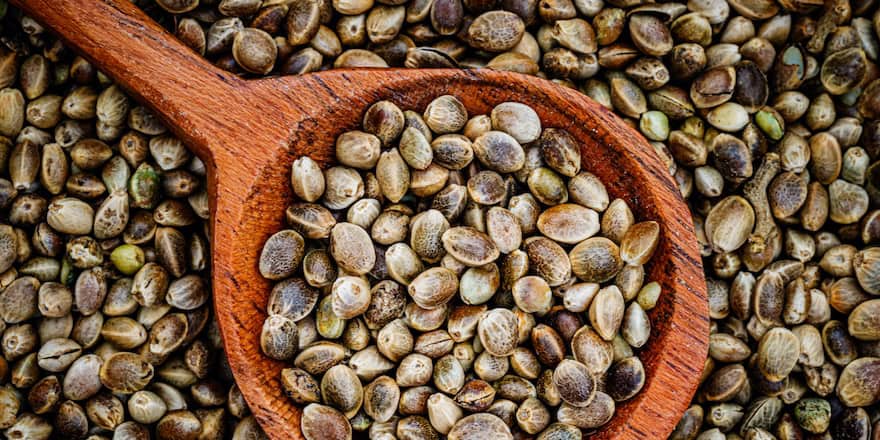
With a taste slightly reminiscent of hazelnut when eaten, hemp seeds are less caloric than their counterparts (365 calories per 100 g) with just as many nutritional benefits.
They deserve a prominent place in a balanced and varied diet for their content of protein, magnesium, potassium, and their omega-6 to omega-3 ratio as perfect as that of sesame seeds.
Low in sugar and rich in insoluble fibers, they are perfectly suitable if you are looking to lose weight or if you suffer from diabetes. Although a cannabinoid, they are free from THC and CBD.
You can add them as they are or prefer them toasted in a pan. The right amount: 2 teaspoons of hemp seeds in your yogurt or cottage cheese, up to twice a day.
6. Sunflower Seeds for General Well-being
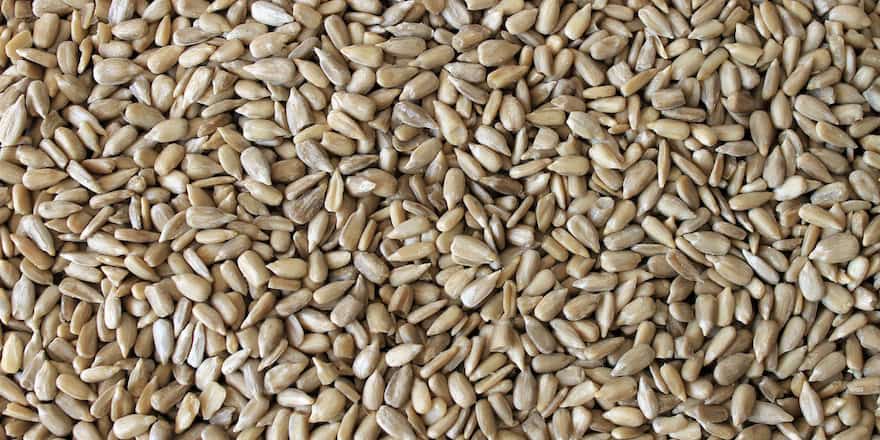
Rich in antioxidant vitamin E, sunflower seeds are loaded with lipids, mainly omega-6. They are the most energetic with 620 calories per 100 g.
The concentration of fibers, mostly insoluble, helps to take care of intestinal transit by naturally increasing stool volume.
Oval-shaped, dark green, and crunchy, they are delicious whole. You can use them toasted or grilled in your yogurts, as you prefer.
The nutritional contributions of yogurt combined with Organic seeds preferably, make this snack ideal at any time of the day. Feel free to add fresh or dried fruits, Goji or cranberry berries, or nuts.
Sources and scientific studies
Aylin Ayaz, Asli Akyol, Elif Inan-Eroglu, Arzu Kabasakal Cetin, Gulhan Samur, Filiz Akbiyik – Chia seed (Salvia Hispanica L.) added yogurt reduces short-term food intake and increases satiety: randomized controlled trial, 2017.
Nafiseh Khandouzi, Ali Zahedmehr, Ali Mohammadzadeh, Hamid Reza Sanati, Javad Nasrollahzadeh – Effect of flaxseed consumption on flow-mediated dilation and inflammatory biomarkers in patients with coronary artery disease, 2019.
L S Marks, A W Partin, J I Epstein, V E Tyler, I Simon, M L Macairan, T L Chan, F J Dorey, J B Garris, R W Veltri, P B Santos, K A Stonebrook, J B deKernion – Effects of a saw palmetto herbal blend in men with symptomatic benign prostatic hyperplasia, 2000.
Pellegrino Cerino, Carlo Buonerba, Giuseppe Cannazza, Jacopo D’Auria, Ermete Ottoni, Andrea Fulgione, Antonio Di Stasio, Biancamaria Pierri, Alfonso Gallo – A Review of Hemp as Food and Nutritional Supplement, 2021.


